状语从句的讲解的状语从句讲解
(完整版)状语从句详解+例句
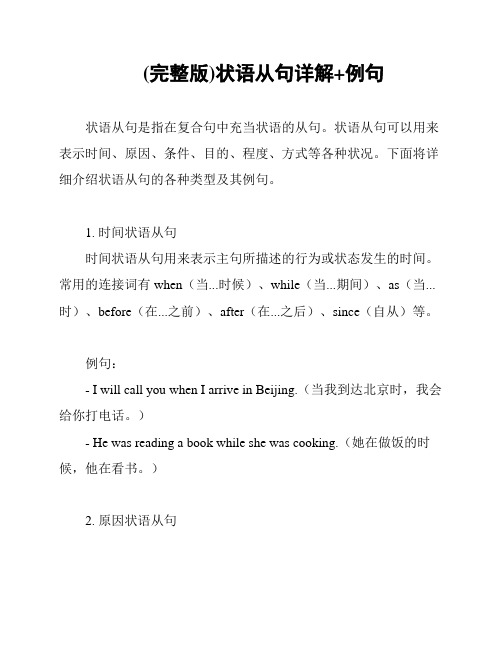
(完整版)状语从句详解+例句状语从句是指在复合句中充当状语的从句。
状语从句可以用来表示时间、原因、条件、目的、程度、方式等各种状况。
下面将详细介绍状语从句的各种类型及其例句。
1. 时间状语从句时间状语从句用来表示主句所描述的行为或状态发生的时间。
常用的连接词有when(当...时候)、while(当...期间)、as(当...时)、before(在...之前)、after(在...之后)、since(自从)等。
例句:- I will call you when I arrive in Beijing.(当我到达北京时,我会给你打电话。
)- He was reading a book while she was cooking.(她在做饭的时候,他在看书。
)2. 原因状语从句原因状语从句用来表示主句所描述的行为或状态的原因。
常用的连接词有because(因为)、since(因为)、as(由于)、for (因为)等。
例句:- I can't go to the party because I have to work.(我不能去参加派对,因为我得工作。
)- Since it is raining, we should stay at home.(由于下雨了,我们应该待在家里。
)3. 条件状语从句条件状语从句用来表示主句所描述的行为或状态的前提条件。
常用的连接词有if(如果)、unless(除非)、whether(无论)、provided(倘若)等。
例句:- If it rains tomorrow, we will stay indoors.(如果明天下雨,我们会呆在室内。
)- We can go shopping unless it is too late.(除非太晚,否则我们可以去购物。
)4. 目的状语从句目的状语从句用来表示主句所描述的行为或状态的目的。
常用的连接词有so that(以便)、in order that(为了)、lest(免得)等。
状语从句知识点详解(初中英语专项复习)14

状语从句知识点详解(初中英语专项复习)状语从句的概念: 用一个句子作状语来修饰动词和形容词,以表明动作发生或状态存在的时间、地点、原因等,这个句子就叫做状语从句。
状语从句的分类:状语从句共分为九大类,包括:时间、地点、原因、条件、让步、目的、结果、方式、比较状语从句。
下面分别讲解:一、时间状语从句概念:用来表示时间的状语从句,由when, while, as, till, until,before, after, since等引导。
由于时间状语从句的引导词所表示的意思并非一致,不同引导词表达不同的时间,它们在句子中对应的时态、语态等也有所不同。
例如:when /while引导的时间状语从句when引导的从句的谓语动词通常是瞬间动词,也可以是延续性动词。
从句动作可与主语动作通常先后发生也可同时发生。
I was writing when my sister came back.( come是瞬间动词,只能用when引导,不能用while)He often wrote me when/while he studied in Shanghai International Studies University.( study 是延续性动词,while可代替when)While my mother was cooking , I was playing chess with dad. (cook是延续性的动词,cook和play同时发生)I like playing chess while my sister likes reading stories.我喜欢下棋,而我姐姐喜欢看小说。
(while表示对比)when和while的区别还有:while引导的时间状语从句多用于进行时态,而when引导的时间状语从句多用于一般时态。
While we were playing games, our headmaster called me .我们正在做游戏的时候,校长叫我了。
状语从句的种类及用法详解

状语从句的种类及用法详解状语从句是一个从句,它在句中充当状语的角色。
状语从句通常用于修饰主句的动词、形容词、副词或整个句子。
状语从句可以用来表示时间、原因、条件、目的、方式、结果等不同的内容。
下面将详细介绍状语从句的种类及用法。
一、时间状语从句时间状语从句用来表示一个动作、事件或状态发生的时间。
常见的引导词有when(当...时候)、while(当...的时候)、before(在...之前)、after(在...之后)、since(自从)、as soon as(一...就)、until (直到)、as long as(只要)等。
例如:1. When I arrived at the airport, the flight had already left.(当我到达机场时,航班已经起飞了。
)2. She will not go to bed until she finishes her homework.(她不会睡觉直到她完成作业。
)二、原因状语从句原因状语从句用来表示主句中的动作或状态发生的原因。
常见的引导词有because(因为)、since(因为)、as(因为)、due to(因为)、owing to(因为)、for the reason that(因为)等。
例如:1. She didn't attend the meeting because she was sick.(她没有参加会议,因为她生病了。
)2. Since it is raining heavily outside, we should stay at home.(由于外面下大雨,我们应该呆在家里。
)三、条件状语从句条件状语从句用来表示主句中的动作或状态发生的条件。
常见的引导词有if(如果)、unless(除非)、provided that(倘若)、as long as (只要)、on condition that(在...条件下)等。
英语状语从句讲解
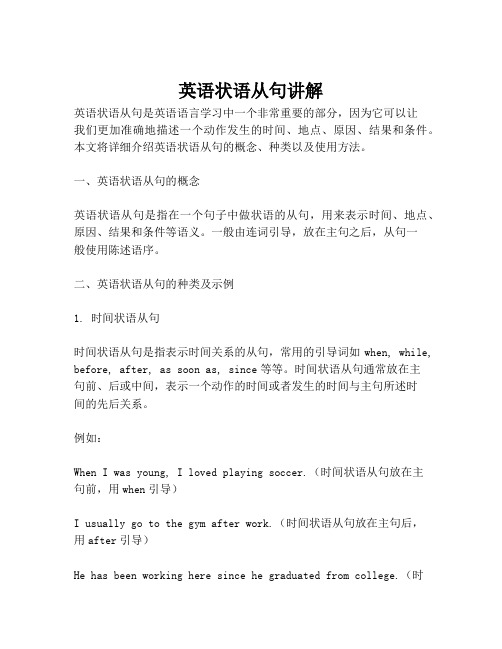
英语状语从句讲解英语状语从句是英语语言学习中一个非常重要的部分,因为它可以让我们更加准确地描述一个动作发生的时间、地点、原因、结果和条件。
本文将详细介绍英语状语从句的概念、种类以及使用方法。
一、英语状语从句的概念英语状语从句是指在一个句子中做状语的从句,用来表示时间、地点、原因、结果和条件等语义。
一般由连词引导,放在主句之后,从句一般使用陈述语序。
二、英语状语从句的种类及示例1. 时间状语从句时间状语从句是指表示时间关系的从句,常用的引导词如when, while, before, after, as soon as, since等等。
时间状语从句通常放在主句前、后或中间,表示一个动作的时间或者发生的时间与主句所述时间的先后关系。
例如:When I was young, I loved playing soccer.(时间状语从句放在主句前,用when引导)I usually go to the gym after work.(时间状语从句放在主句后,用after引导)He has been working here since he graduated from college.(时间状语从句放在主句后,用since引导)2. 地点状语从句地点状语从句表示一个动作所发生的地点,通常由where、wherever 引导。
例如:Wherever you go, I will follow you. (地点状语从句中,wherever 引导)I will go wherever the wind takes me.(地点状语从句中,where 引导)3. 原因状语从句原因状语从句表示主句的动作发生的原因,通常由because、since、as等引导。
例如:Since it was raining outside, I chose to stay at home.(原因状语从句中,since 引导)Because she was sick, she couldn't go to the party.(原因状语从句中,because 引导)4. 结果状语从句结果状语从句用于表示主句所述的情况或动作的结果,通常由so、such...that等引导。
英语状语从句讲解
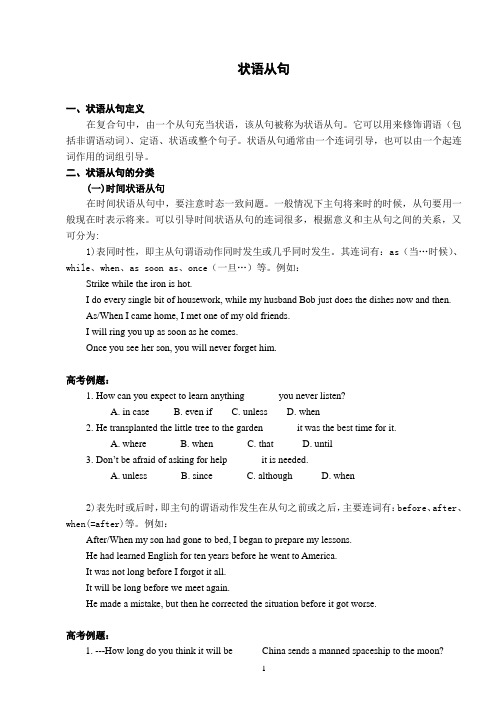
状语从句一、状语从句定义在复合句中,由一个从句充当状语,该从句被称为状语从句。
它可以用来修饰谓语(包括非谓语动词)、定语、状语或整个句子。
状语从句通常由一个连词引导,也可以由一个起连词作用的词组引导。
二、状语从句的分类(一)时间状语从句在时间状语从句中,要注意时态一致问题。
一般情况下主句将来时的时候,从句要用一般现在时表示将来。
可以引导时间状语从句的连词很多,根据意义和主从句之间的关系,又可分为:1)表同时性,即主从句谓语动作同时发生或几乎同时发生。
其连词有:as(当…时候)、while、when、as soon as、once(一旦…)等。
例如:Strike while the iron is hot.I do every single bit of housework, while my husband Bob just does the dishes now and then.As/When I came home, I met one of my old friends.I will ring you up as soon as he comes.Once you see her son, you will never forget him.高考例题:1. How can you expect to learn anything ______ you never listen?A. in caseB. even ifC. unlessD. when2. He transplanted the little tree to the garden ______ it was the best time for it.A. whereB. whenC. thatD. until3. Don’t be afraid of asking for help ______ it is needed.A. unlessB. sinceC. althoughD. when2)表先时或后时,即主句的谓语动作发生在从句之前或之后,主要连词有:before、after、when(=after)等。
状语从句的种类和用法详细分析

状语从句的种类和用法详细分析状语从句是英语语法中的一种从句,它在句子中充当状语的作用,用来修饰谓语动词或整个句子。
本文将详细介绍状语从句的种类和用法。
一、时间状语从句时间状语从句用来表示一个动作或事件发生的时间,它的引导词有:when, while, as, before, after, since等。
例如:1. When I arrived at the office, everyone had already left.2. After she finished her homework, she went to bed.二、原因状语从句原因状语从句用来表示一个动作或事件的原因,它的引导词有:because, since, as等。
例如:1. He couldn't attend the meeting because he was sick.2. Since it was raining heavily, we decided to stay at home.三、条件状语从句条件状语从句用来表示在特定条件下会发生的情况,它的引导词有:if, unless, provided that等。
例如:1. If it rains tomorrow, we will stay indoors.2. Unless you study hard, you won't pass the exam.四、方式状语从句方式状语从句用来表示一个动作或事件的方式,它的引导词有:as, like等。
例如:1. You should do it as I told you.2. He acted like he didn't care about anything.五、地点状语从句地点状语从句用来表示一个动作或事件的地点,它的引导词有:where, wherever等。
例如:1. I will go wherever you go.2. The children played in the park where their parents could watch them.六、目的状语从句目的状语从句用来表示一个动作或事件的目的,它的引导词有:so that, in order that等。
状语从句用法详解
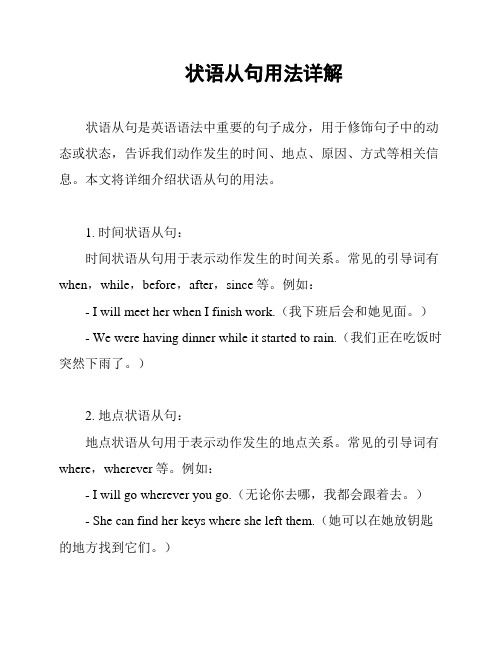
状语从句用法详解状语从句是英语语法中重要的句子成分,用于修饰句子中的动态或状态,告诉我们动作发生的时间、地点、原因、方式等相关信息。
本文将详细介绍状语从句的用法。
1. 时间状语从句:时间状语从句用于表示动作发生的时间关系。
常见的引导词有when,while,before,after,since等。
例如:- I will meet her when I finish work.(我下班后会和她见面。
)- We were having dinner while it started to rain.(我们正在吃饭时突然下雨了。
)2. 地点状语从句:地点状语从句用于表示动作发生的地点关系。
常见的引导词有where,wherever等。
例如:- I will go wherever you go.(无论你去哪,我都会跟着去。
)- She can find her keys where she left them.(她可以在她放钥匙的地方找到它们。
)3. 原因状语从句:原因状语从句用于表示某个动作或状态的原因。
常见的引导词有because,since,as等。
例如:- As it was getting late, we decided to leave.(由于时间很晚,我们决定离开。
)4. 方式状语从句:方式状语从句用于表示某个动作或状态的方式。
常见的引导词有as,like,as if等。
例如:- She danced as if nobody was watching.(她像没人看着一样跳舞。
)- He treats me like a princess.(他像对待公主一样对待我。
)需要注意的是,在使用状语从句时,需要注意主句和从句之间的时态和语序的一致性。
此外,状语从句通常位于主句之前或之后,但也可以放在主句的中间。
总结:状语从句是用于修饰句子中动态或状态的从句,用于表示时间、地点、原因、方式等相关信息。
高中英语状语从句用法详解
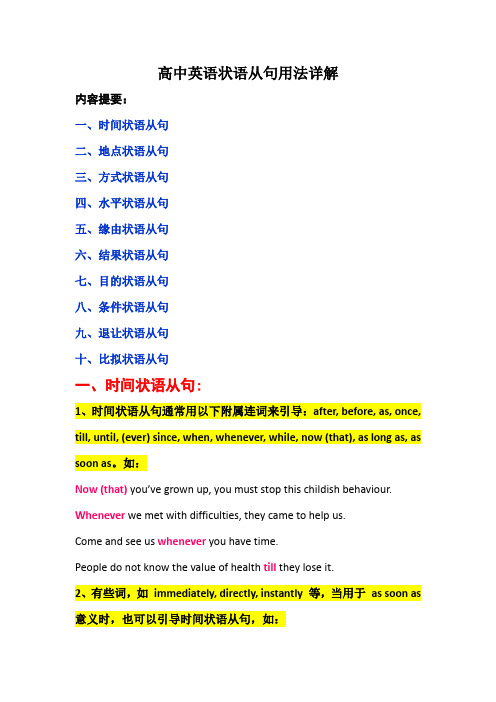
高中英语状语从句用法详解内容提要:一、时间状语从句二、地点状语从句三、方式状语从句四、水平状语从句五、缘由状语从句六、结果状语从句七、目的状语从句八、条件状语从句九、退让状语从句十、比拟状语从句一、时间状语从句:1、时间状语从句通常用以下附属连词来引导:after, before, as, once, till, until, (ever) since, when, whenever, while, now (that), as long as, as soon as。
如:Now (that)you’ve grown up, you must stop this childish behaviour. Whenever we met with difficulties, they came to help us.Come and see us whenever you have time.People do not know the value of health till they lose it.2、有些词,如immediately, directly, instantly 等,当用于as soon as 意义时,也可以引导时间状语从句,如:I got in touch with him immediately I received his letter.My sister came directly she got my message.The machine will start instantly you press the button.I’ll telephone you directly I hear the news.Will you look for it immediately you get there?3.某些表示时间的名词词组,如the (very) moment ( = as soon as ), the minute ( = as soon as ), the instant ( = as soon as ), the day, the year, the morning, every time, each time, next time, the first time 等,也可以引导时间状语从句,如:I’ll tell you about it the moment you come.I started the instant I heard the report.The instant she saw him she knew he was her brother.Every time I catch a cold, I have pain in my back.I’m going to see him next time he comes to Shenzhen.He left Europe the year World WarⅡbroke out.He had impressed me that way the first time I met him.I started the very moment I got your letter.I’ll tell him the minute (that) he gets here.4.有些关联附属连词,如no sooner …than / hardly …when / scarcely …when / barely …when 等,也能引导时间状语从句。
状语从句的用法(基础讲解)

状语从句的用法【概念引入】1. 状语从句名言:(1)时间状语从句As soon as man is born,he begins to die.出生之时,死亡之始。
Life is half spent before we know what it is.在我们知道生活是什么时,生活已经过去一半了。
(2)地点状语从句Where there is great love,there are always miracles.哪里有伟大的爱,哪里就有奇迹。
(3)原因状语从句Some people will never learn anything,because they understand everything too soon.有些人绝不能学到什么东西,因为,他们对任何东西都懂得太快。
(4)条件状语从句If winter comes,can spring be far behind?冬天来了,春天还会远吗?(5)让步状语从句A liar is not believed even though he tells the truth.说谎者即使在说实话时也没人相信。
2. 状语从句定义:用一个句子(从句)来作另一个句子(主句)的状语,用作状语的句子就叫作状语从句。
作什么样的状语就叫什么类型的状语从句。
引导状语从句的连接词是从属连词,状语从句可以放在句首,也可以放在句尾。
状语从句的类型主要有:时间状语从句、地点状语从句、原因状语从句、结果状语从句、目的状语从句、条件状语从句及比较状语从句等。
【用法讲解】1. 时间状语从句:时间状语从句在主句中表示时间,常用连接词有:when(当……时),while(当……时),as(当……时),before(在……之前),after(在……之后),since(自从),not…until(直到……才),as soon as(一……就),once(一旦……就)等。
例如:I didn’t go to bed until I finished my homework. 我直到做完作业才去睡觉。
高中英语状语从句讲解
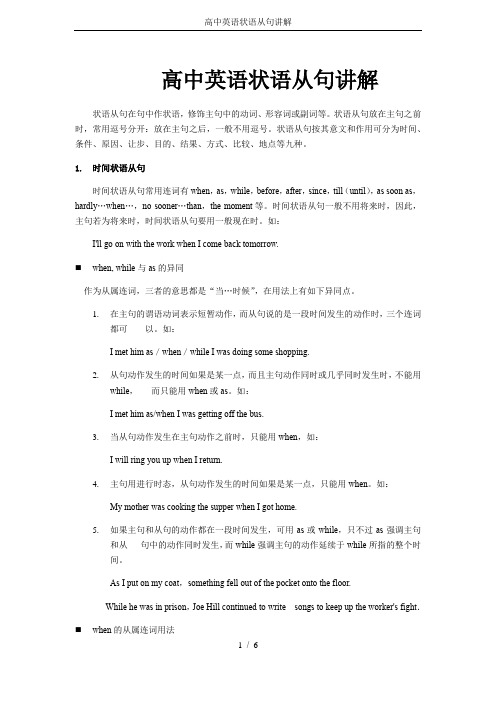
高中英语状语从句讲解状语从句在句中作状语,修饰主句中的动词、形容词或副词等。
状语从句放在主句之前时,常用逗号分开:放在主句之后,一般不用逗号。
状语从句按其意文和作用可分为时间、条件、原因、让步、目的、结果、方式、比较、地点等九种。
1.时间状语从句时间状语从句常用连词有when,as,while,before,after,since,till(until),as soon as,hardly…when…,no sooner…than,the moment等。
时间状语从句一般不用将来时,因此,主句若为将来时,时间状语从句要用一般现在时。
如:I'll go on with the work when I come back tomorrow.⏹when, while与as的异同作为从属连词,三者的意思都是“当…时候”,在用法上有如下异同点。
1.在主句的谓语动词表示短暂动作,而从句说的是一段时间发生的动作时,三个连词都可以。
如:I met him as/when/while I was doing some shopping.2.从句动作发生的时间如果是某一点,而且主句动作同时或几乎同时发生时,不能用while,而只能用when或as。
如:I met him as/when I was getting off the bus.3.当从句动作发生在主句动作之前时,只能用when,如:I will ring you up when I return.4.主句用进行时态,从句动作发生的时间如果是某一点,只能用when。
如:My mother was cooking the supper when I got home.5.如果主句和从句的动作都在一段时间发生,可用as或while,只不过as强调主句和从句中的动作同时发生,而while强调主句的动作延续于while所指的整个时间。
As I put on my coat,something fell out of the pocket onto the floor.While he was in prison,Joe Hill continued to write songs to keep up the worker's fight.⏹when的从属连词用法when作为从属连词引导时间状语从句,既可放在主句之前,也可放在主句之后。
状语从句详解

状语从句详解状语从句是复句中的一种从句,用来修饰动词、形容词、副词或整个句子。
它起到进一步说明、补充或限制主句的作用。
本文将详细解析状语从句的定义、分类、用法及注意事项。
一、状语从句的定义状语从句是一个从属分句,由连词引导,在主从句之间建立一种从属关系。
它通常修饰动词、形容词、副词或整个句子,用来表示时间、条件、原因、目的、方式、程度、比较等等。
通过引导词的不同,状语从句可以分为多种类型。
二、状语从句的分类1. 时间状语从句时间状语从句用来表示动作发生的时间,在主句中起到修饰的作用。
时间状语从句常用的引导词有:when(当)、while(当...时)、before (在...之前)、after(在...之后)、as(当...的时候)等等。
例如:- I will call you when I arrive home.(我到家后会给你打电话。
)- They went to bed after they finished their homework.(他们做完作业后就上床睡觉了。
)2. 条件状语从句条件状语从句用来表示主句发生的条件,在主句中起到修饰的作用。
条件状语从句常用的引导词有:if(如果)、unless(除非)、provided that(只要)、as long as(只要)等等。
例如:- If it rains, we will stay at home.(如果下雨,我们将待在家里。
)- You can go out unless it is too cold.(除非天气太冷,你可以出去。
)3. 原因状语从句原因状语从句用来表示主句发生的原因,在主句中起到修饰的作用。
原因状语从句常用的引导词有:because(因为)、since(因为)、as (因为)、for(因为)等等。
例如:- She didn't come to the party because she was sick.(她没有来参加聚会,因为她生病了。
英语状语从句的讲解和例子

英语状语从句的讲解和例子英语状语从句的讲解和例子状语从句是一种从句,它位于句子的其他成分之前,作状语,表示时间、原因、条件、让步、结果、目的、方式、比较等意义。
状语从句中的动词要用陈述句语序,即谓语动词用一般现在时,谓语动词变成主语前有任何插入语时,谓语动词用一般过去时。
1、时间状语从句时间状语从句的关联词有:when,while,as,before,after,since,until,as soon as,hardly…when,no sooner…than,the moment,as long as,whenever等。
例句:1) I will go there when I finish my work.2) We had scarcely arrived when it started to rain.2、原因状语从句原因状语从句的关联词有:as,because,since,now that,for,in that,inasmuch as,as if,as long as,where(as)等。
例句:1) I can't go out because I have to finish my homework.2) As he was ill, he couldn't go to school.3、条件状语从句条件状语从句的关联词有:if,unless,only if,provided(that),supposing(that),in case,on condition(that),even if,so longas等。
例句:1) If it rains tomorrow, we won't go out.2) I will finish the work even if it takes me all night.4、让步状语从句让步状语从句的关联词有:though,although,while,whereas,no matter(how),whatever,regardless(of)等。
(完整)状语从句讲解
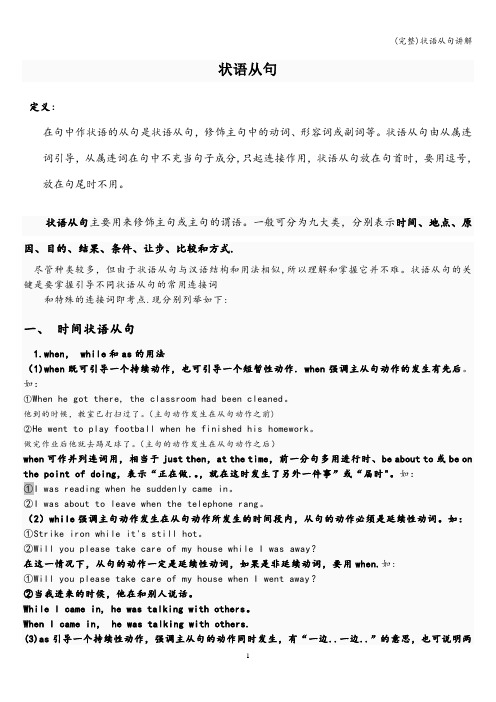
状语从句定义:在句中作状语的从句是状语从句,修饰主句中的动词、形容词或副词等。
状语从句由从属连词引导,从属连词在句中不充当句子成分,只起连接作用,状语从句放在句首时,要用逗号,放在句尾时不用。
状语从句主要用来修饰主句或主句的谓语。
一般可分为九大类,分别表示时间、地点、原因、目的、结果、条件、让步、比较和方式.尽管种类较多,但由于状语从句与汉语结构和用法相似,所以理解和掌握它并不难。
状语从句的关键是要掌握引导不同状语从句的常用连接词和特殊的连接词即考点.现分别列举如下:一、时间状语从句1.when, while和as的用法(1)when既可引导一个持续动作,也可引导一个短暂性动作. when强调主从句动作的发生有先后。
如:①When he got there, the classroom had been cleaned。
他到的时候,教室已打扫过了。
(主句动作发生在从句动作之前)②He went to play football when he finished his homework。
做完作业后他就去踢足球了。
(主句的动作发生在从句动作之后)when可作并列连词用,相当于just then,at the time,前一分句多用进行时、be about to或be on the point of doing,表示“正在做.。
,就在这时发生了另外一件事”或“届时"。
如:①I was reading when he suddenly came in。
②I was about to leave when the telephone rang。
(2)while强调主句动作发生在从句动作所发生的时间段内,从句的动作必须是延续性动词。
如:①Strike iron while it's still hot。
②Will you please take care of my house while I was away?在这一情况下,从句的动作一定是延续性动词,如果是非延续动词,要用when.如:①Will you please take care of my house when I went away?②当我进来的时侯,他在和别人说话。
状语从句讲解及习题附答案
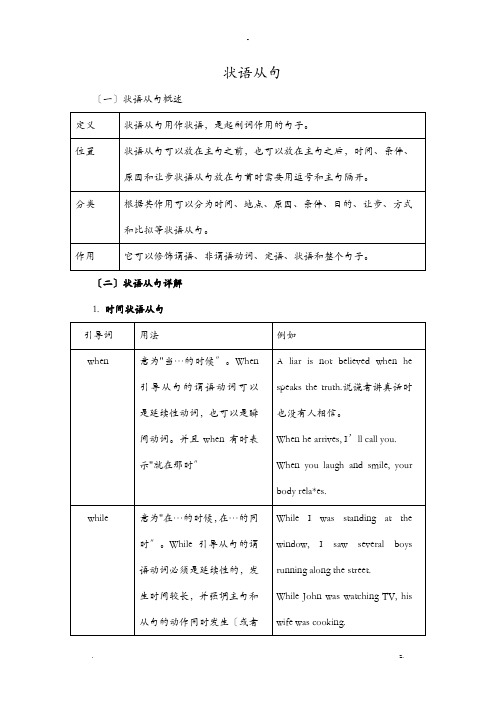
状语从句〔一〕状语从句概述〔二〕状语从句详解1. 时间状语从句2.地点状语从句3.条件状语从句4.原因状语从句5.目的状语从句6.结果状语从句7.让步状语从句8. 比拟状语从句9.方式状语从句练习一一. 单项填空1. _______ he’s old, he can still carry this heavy bag.A. ThoughB. SinceC. ForD. So2. ---Do you know if he _______ to play basketball with us"---I think he will e if he ______ free tomorrow.A. es; isB. es; will beC. will e; isD. will e; will be3. In the zoo if a child _____ into the water and can’t swim, the dolphins may e up ______ him.A. will fall; to helpB. falls; to helpC. will fall; helpD. falls; helping4. I don’t remember ________ he worked in that city when he was young.A. whatB. whichC. whereD. who5. We will stay at home if my aunt ________ to visit us tomorrow.A. esB. eC. will eD. is ing6. The police asked the children _______ cross the street ________ the traffic lights turned green.A. not; beforeB. don’t; whenC. not to; untilD. not; after7. I was late for class yesterday _______ there was something wrong with my bike.A. whenB. thatC. untilD. because8. I’ll go swimming with you if I ________ free tomor row.A. will beB. shall beC. amD. was9. In the e*am, the ________ you are, ______ the _______ mistakes you will make.A. careful; littleB. more careful; fewestC. more careful; fewerD. more careful; less10. You should finish your lessons _______ you go out to play.A. beforeB. afterC. whenD. while11. I hurried _____ I wouldn’t be late for class.A. sinceB. so thatC. as ifD. unless12. When you read the book, you’d better make a mark _______ you have any questions.A. whichB. thatC. whereD. though13. The teacher raised his voice _______ all the students could hear him.A. forB. so thatC. becauseD. in order14. He took off his coat _______ he felt hot.A. becauseB. asC. ifD. since15. It is ______ that we’d like to go out for a walk.A. a lovely dayB. too lovely a dayC. so lovely a dayD. such lovely a day16. Mary had ______ much work to do that she stayed at her office all day.A. suchB. soC. tooD. very17. _______ I felt very tired, I tried to finish the work.A. AlthoughB. BecauseC. AsD. As if18. ______ the day went on, the weather got worse.A. WithB. SinceC. WhileD. As19. ______ well you can drive, you must drive carefully.A. So long asB. In order thatC. No matter howD. The moment20. Write to me as soon as you ________ to Beijing.A. will getB. getC. gettingD. got二. 根据中文意思完成以下英语句子1. 不管他跟我开什么玩笑,我都不生气。
超详细的状语和状语从句讲解

目的状语
目的状语是用来表示某个动作或 状态的目的的词语。例如:so
that, in order to等。
目的状语可以表示某个动作或状 态的目的,以及实现该目的的方
式或手段。
目的状语在句子中通常放在句首 或句尾,有时也可以放在句中。
让步状语
让步状语是用来表示某个动作或状态在某种情况下仍然发生的词语。例 如:though, although, even if等。
详细描述
翻译题练习通常会提供中文或英文的句子, 让学生将其翻译成另一种语言,这有助于学 生理解不同语言的表达方式和语法结构,提
高语言转换能力。
THANKS.
时间状语可以表示过去、现在 或未来的时间,也可以表示某 个动作或状态发生的时间点或 时间段。
时间状语在句子中通常放在句 首或句尾,有时也可以放在句 中。
地点状语
地点状语是用来表示动作或状态 发生的地点的词语。例如: here, there, where等。
地点状语可以表示某个具体的地 点,也可以表示某个范围或区域。
填空题练习
总结词
填空题练习可以帮助学生更好地掌握状语和 状语从句的语法结构和用法。
详细描述
填空题练习通常会提供句子,并让学生填写 适当的状语或状语从句,这有助于学生理解 句子结构和语法规则,提高语言运用能力。
翻译题练习
总结词
翻译题练习可以帮助学生更好地理解和运用 状语和状语从句,提高语言表达能力。
详细描述
让步状语从句用于描述动作的让步或 转折,常用的引导词有though、 even if等。
比较状语从句
总结词
表示动作之间的比较关系
详细描述
比较状语从句用于描述动作之间的比 较关系,常用的引导词有than、as等。
状语从句的位置和作用解析与实例
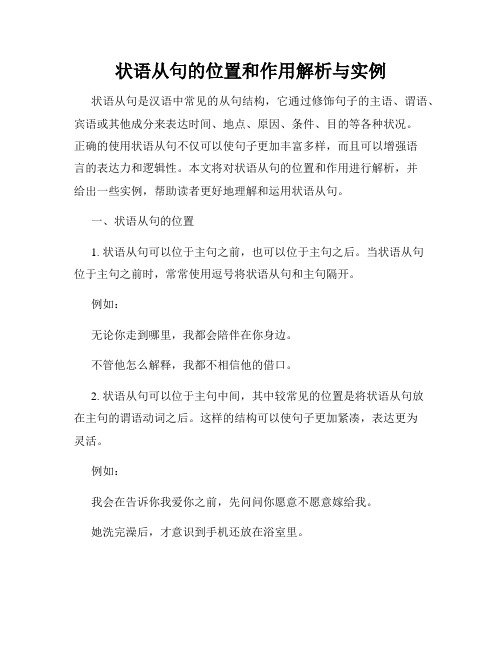
状语从句的位置和作用解析与实例状语从句是汉语中常见的从句结构,它通过修饰句子的主语、谓语、宾语或其他成分来表达时间、地点、原因、条件、目的等各种状况。
正确的使用状语从句不仅可以使句子更加丰富多样,而且可以增强语言的表达力和逻辑性。
本文将对状语从句的位置和作用进行解析,并给出一些实例,帮助读者更好地理解和运用状语从句。
一、状语从句的位置1. 状语从句可以位于主句之前,也可以位于主句之后。
当状语从句位于主句之前时,常常使用逗号将状语从句和主句隔开。
例如:无论你走到哪里,我都会陪伴在你身边。
不管他怎么解释,我都不相信他的借口。
2. 状语从句可以位于主句中间,其中较常见的位置是将状语从句放在主句的谓语动词之后。
这样的结构可以使句子更加紧凑,表达更为灵活。
例如:我会在告诉你我爱你之前,先问问你愿意不愿意嫁给我。
她洗完澡后,才意识到手机还放在浴室里。
3. 状语从句还可以位于句首或句尾,但这种结构较为固定,一般用于特殊的句式或表达方式。
例如:每当夜幕降临,我就感到一种莫名的孤独。
他是个善于思考的人,然而,这并不意味着他是个聪明的人。
二、状语从句的作用1. 时间状语从句:用来修饰主句中动作发生的时间。
例如:当我们看到那只流浪狗时,大家的眼泪都止不住。
她来中国的时候,正值中国的春节。
2. 地点状语从句:用来修饰主句中动作发生的地点。
例如:无论你走到哪里,我都会陪伴在你身边。
他在哪里工作都无所谓,只要能赚到足够的钱。
3. 原因状语从句:用来解释主句中动作的原因。
例如:我不喜欢他,是因为他总是对我撒谎。
既然你不喜欢这个餐厅的菜,我们就换一个地方吃吧。
4. 条件状语从句:用来表示主句动作发生的前提条件。
例如:如果你愿意,我们可以一起去看电影。
只要你肯努力,就一定会取得好成绩。
5. 目的状语从句:用来表示主句动作的目的或意图。
例如:我学习英语是为了能和外国人交流。
他奋斗的目标是为了给家人一个更好的生活。
三、状语从句的实例1. 时间状语从句:当他听到好消息时,高兴得跳了起来。
状语从句的引导词和从句结构

状语从句的引导词和从句结构状语从句是汉语中的一种从属分句,用来修饰谓语或其他成分,通常用于表达条件、原因、目的、结果、方式等语义。
在状语从句中,引导词起到了连接主句和从句的作用,同时也决定了从句的结构。
下面将介绍常见的状语从句引导词以及从句的结构。
1. 条件状语从句条件状语从句用来表示一种假设情况,通常由以下引导词引导:如果、假如、要是、倘若、除非等。
从句结构:主语 + 谓语 + 其他成分例如:如果明天下雨,我们就不去郊游。
2. 原因状语从句原因状语从句用来表示某个动作或情况的原因,通常由以下引导词引导:因为、由于、既然、既使等。
从句结构:主语 + 谓语 + 其他成分例如:由于交通堵塞,他迟到了。
3. 目的状语从句目的状语从句用来表示某个动作或情况的目的,通常由以下引导词引导:为了、以便、以免等。
从句结构:主语 + 谓语 + 其他成分例如:为了取得好成绩,他每天都加班学习。
4. 结果状语从句结果状语从句用来表示某个动作或情况的结果,通常由以下引导词引导:所以、因此、以致、结果等。
从句结构:主语 + 谓语 + 其他成分例如:她很努力学习,所以考试成绩一直很好。
5. 方式状语从句方式状语从句用来表示某个动作或情况发生的方式,通常由以下引导词引导:怎样、如何等。
从句结构:主语 + 谓语 + 其他成分例如:他解释得很详细,怎样做这个实验就清楚了。
总结:状语从句通过引导词来引导,并根据不同的引导词来决定从句的结构。
在写作中,我们可以灵活运用状语从句来丰富句子的内容,使句子更加准确、清晰,达到更好的表达效果。
状语从句的讲解的状语从句讲解
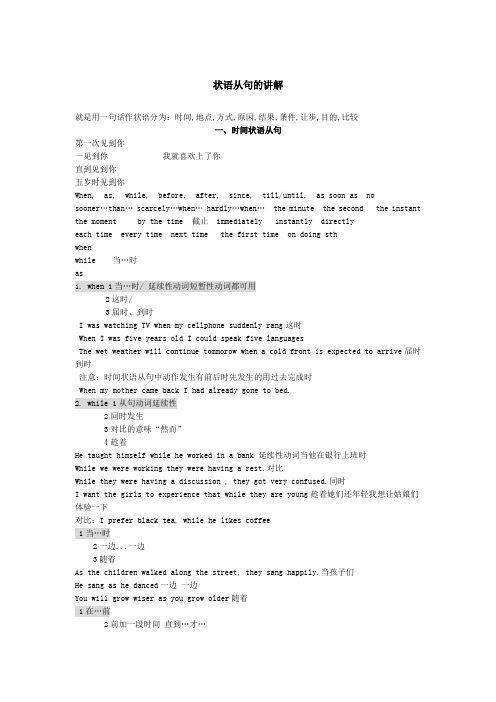
状语从句的讲解就是用一句话作状语分为:时间,地点,方式,原因,结果,条件,让步,目的,比较一、时间状语从句第一次见到你一见到你我就喜欢上了你直到见到你五岁时见到你When, as, while, before, after, since, till/until, as soon as no sooner…than… scarcely…when… hardly…when… the minute the second the instant the moment by the time 截止 immediately instantly directlyeach time every time next time the first time on doing sthwhenwhile 当…时as1. when 1当…时/ 延续性动词短暂性动词都可用2这时/3届时、到时I was watching TV when my cellphone suddenly rang这时When I was five years old I could speak five languagesThe wet weather will continue tommorow when a cold front is expected to arrive届时到时注意:时间状语从句中动作发生有前后时先发生的用过去完成时When my mother came back I had already gone to bed.2. while 1从句动词延续性2同时发生3对比的意味“然而”4趁着He taught himself while he worked in a bank 延续性动词当他在银行上班时While we were working they were having a rest.对比While they were having a discussion , they got very confused.同时I want the girls to experience that while they are young趁着她们还年轻我想让姑娘们体验一下对比:I prefer black tea, while he likes coffee1当…时2一边...一边3随着As the children walked along the street, they sang happily.当孩子们He sang as he danced一边一边You will grow wiser as you grow older随着1在…前2前加一段时间直到…才…3还没来得及4要过…时间才I’ll be back before you leaveIt may be many years before we meet again 可能要过很多年我们才能见面The students rushed outside before I could finished my word 还没等我讲完It will be three weeks before he finished his workIt won’t be long before he finished his work. 用不了多久After my friend got married, she went to live in America自从主句一般为现在完成时We’ve never met since we graduated from the collegeGreat changes have taken place since you leftuntill肯定句中可互换直到…为止否定句中只用not…until…直到…才Not until 放句首句子部分倒装倒装主句Donald will remain in college until/till he finished his PhD course Donald won’t leave college until he finished his PhD courseI won’t go with you until I finished my homeworkNot until my mother came back did I go to bedsoon asI gave the alarm as soon as I saw the smoke.一看见冒烟就发出警报He will be set free as soon as the fine is paidminuteThe secondThe instant瞬间片刻立即的立刻的素食的The momentThe minute we got home, the telephone rang10. no sooner…than…Scarcely…when…Hardly…when…I had no sooner got home than it began to rain.The fans had hardly seen the movie star when they criedThe fans had scarcely seen the movie star when they cried注意:他们提前句子部分倒装No sooner had I got home than it began to rain.Hardly had I got home when it began to rainScarcely had the fans seen the movie star when they cried11.名词引导的时间状语从句The first time I saw you I mistook you for a film starNext time I see you I will tell you the truthEvery time/each time I see this picture I think of my hometown.12. On+ doing 一…就…On arriving home, he discovered they had gone 一到家发现他们已经走了instantly directlyImmediately she had gone, I remembered her name.她刚走开我就想起了她的名字the time 1从句是一般现在时主句用将来完成时2从句是一般过去时主句用过去完成时By the time you receive this letter, I will have left this cityI shall have finished it by the time you come back 你回来以前我就做完了By the time I got there, the bus had already left.注意:as soon as after before 常与过去完成时连用After I had finished my homework I went to sleepBefore I went to sleep I had finished my homeworkAs soon as I had finished my homework I went ot sleep.但是如果不强调时间的先后都可以用一般过去时After I finished my homework I went to sleep/二、地点状语从句一、Where在…地方 wherever无论哪里 anywhere任何地方 everywhere到处You should put the book where you found itWe must camp where we can find waterYou had better make a mark where you have any questions.wherever there is smoke, there is fireplease put the cup wherever that is convinientYou can put it anywhere you likeI can’t stay anywhere there are a lot of peopleEverywhere I go, I find the same thing.去到的每一处都看到同样的情况I have searched everywhere there is a clue二、与定语从句的区别1.定语从句中where是关系副词在从句中充当状语前面有表示地点的名词状语从句中where是从属连词引导的从句修饰主句的谓语动词整个句子做状语前面无先行词Bamboo grows best in places where it is warm and where it rains often.Bamboo grows best where it is warm and where it rains often.Go back where you came fromGo back to the place where you came引导的状从可放在句首与句末都可而where 引导的定语从句只放在句末三、练习advised me to live_______ the air is fresherA. in where which C. the place where D. where2. in peace too, the Red Cross is expected to send help _______ there is human sufferingA. whoever C. whatever3. if you are travelling____the customs are really foreign to you own . please do as the Romans doA. in whichB. whatC. whenD. where三、原因状语从句Because since for as now that in that because of 既然鉴于 in as much as 既然鉴于in so far as鉴于考虑到considering that seeing that given thatFor the reason that 由于…原因 due to the fact that 由于…事实 owing to the fact that1语气最强常放句末2回答why 的问句3强调句I missed the train because I got up late.He is disappointed because he failed againBecause he failed again so he is disappointed错不能出现so注意;because 前可以加程度副词 simply because just merely mainlyIt is because she is too inexperienced that she does not know how to deal with the situation语气弱一些表示对方已知的已经存在的原因“既然”常常放句首Since you are not interested, I won’t tell you about itSince no one is against it, we will pass it 通过了“由于’表示较为明显的原因常放句首As it is snowing, you’d better take a taxiAs you request it , I will come1表示猜测的原因放句末用逗号隔开2多用于书面语不表示直接原因对前面的句子附带说明It must have rained last night, for the ground is wetI went to see him, for I had something to tell him.I want to be an engineer,for it’s my dreamthat 既然=since表示新出现的情况促成某事的发生放句首居多已经有的情况目前的状况Steven, I heard that the flight ticket to America is cheap recently . Now that you have time, whynot we go there together.Now that we can’t change the fact, let’s accept it.6. in that仅因为就因为有限制意味多用于否定中Some old people only remember happy things in that they can’t get used to this fast societyI don’t like sports in that I am good at it7. in as much as in so far as既然鉴于In so far as it is not my fault, I don’t care.In as much as the debtor has no property, I abandon my claimthat 考虑到鉴于补充说明She knows quite a lot about it, considering that she is very young.Considering that she is just a child, I am not very strict with herthat由于因为鉴于已有情况Seeing that he’s been sick all week, he is unlikely to come today.Seeing that you live next door to Mr Black, you should recognize her.10. for the reason that 很正式的书面表达Due to the fact thatOwing to the fact thatI left that country due to the fact that I can’t accept its cultureFor the reason thatOwing to the fact that11. given that 由于鉴于Given that you are new here, I will show you around.四、条件状语从句一、If unless=if not if only as long as = so long as on condition that in case假如以防万一provided that = providing that suppose that = supposing that once1. if 如果1真实条件句2非真实条件句虚拟语气If it doesn’t rain we will go climbingIf you have any question, you can voice them now. 可以提出来主将从先主情从现If I were a bird, I would fly=if notYou will be late, unless you hurry= You’ll be late, if you don’t hurryIf you don’t visit him tomorrow, he will be angry= Unless you visit him tomorrow he’ll be angryI won’t forgive you unless you apologize= I won’t forgive you, If you don’t apologize only 只要如果要是…就好了I’ll let you use my car, if only you return it省略主句用虚拟If only he knew EnglishcaseTake a coat in case the weather turns cold 主祈使从现In case I forget, please remind me about it如果我忘了请提醒我I’ll give you my phone number in case you want to contact me 主将从现注意:in case of+ 名词表条件以防 in that case在那种情况下In case of rain they can’t go to the park 万一下雨他们就不能去公园了In that case, he would be punished情况如此他就会收到惩罚long as= so long as只要如果主将从现主情从现As long as it doesn’t rain, we can go to playAs long as/so long as we don’t lose heart, we’ll find a way to overcome the difficulty You can go to see the film as/so long as you arrive on time 只要你按时到你就能去看这场电影注意:as long as 还有…之久的意思You can keep it as long as you can = You can keep it as long as possible你可以尽量久地保留它conditiong that 条件是只要I’ll come on conditon that Amy is invited too我可以来条件是艾米也被邀请了that= providing thatProviding there is no objection, we shall make a decisionHe won’t be against us in the meeting provided that we ask for his advice只要我们征求他的意见that=supposing that 假如假设Supposing it rains, shall we visit the museumSuppose that you are a famous writer, do you like to write such a bookI’ll make friends once I’m settled in Paris.二、时态的一致1.时间状语从句和条件状语从句中遵从主将从现主情从现主祈使从现He’ll be a doctor when he finishes studying here.If it doesn’t rain tomorrow, we’ll start出发If you get the book, let me know.If you like, you can stay here for the weekend.在这里过周末If you drink, don’t drive2.如果谓语是want hope 等动词,则条件状从一般用一般现在时What do you want to do if you have much moneyI hope to see her if I’m free3.有些句子中主从句都用一般现在时If you ring this number, no one answersIf you press the switch, the computer comes on如果你按这个开关计算机就会启动4.条件状从中也可用的will表示意愿If you won’t go, you needn’t go/won’t go 如果你不愿意去,那就不去If you’ll just wait a moment, I’ll find someone to help you 如果你愿意等一会我会找人帮你五、目的状语从句So that in order that lest以免 for fear that 唯恐 so that in case 以免that为了I spoke slowly so that you could understand me.order that 为了She raised her voice in order that she might be heard= she raised her voice so that she might be heard注意:in order that 与so that 可以改为不定式做目的状语= in order to do so as to do to doShe raised her voice so as to be heard 因为so as to do 不可以放句首In order to be heard she raised her voice = she raised her voice in order to be heard To be heard she raised her voice = she raised her voice to be heard以防常用于虚拟语气 lest sb should doI wrote down the date of his birthday lest I should forget itI was afraid to open the door lest he should follow mefear that常与虚拟连用 for fear that sb should/may/might doShut the window for fear that it may rainHe took an umbrella with him for fear that it might raincaseHe took a gun in case he met any wild animals 他带上枪以防遇到野兽6. so 这样为了Come to my house so I could tell you all about itHe wrote the Bible in Enlish so all could read itLet’s take the front seats that we may see more clearly.六、结果状语从句一、So…that such…that so that that so1. so…that 如此以至于中间加形容词和副词He worked so hard that he passed the exam副词They were so excited that they cried out 如此激动以至于大喊大叫形容词注意:1So 位于句首句子倒装He was injured so badly that he had to be sent to the hospital.So badly was he injured that he had to be sent to the hospitalThe novel was so boring that he gave up reading itSo boring was the novel that he gave up reading it2如果结果状从是否定可以替换成too…to..句型David was so careless that he didn’t find the mistakes in his test paper.David was too careless to find the mistakes in his test paper.…that 加名词He was such a fool that he made a terrible mistakeThis book is written in such easy English that even little children can understand it.注意:such 位于句首倒装Such a good boy is he that we all love him注意:当有形容词的时候1)中间加单数可数名词it gave him such a shock that his face turned white 使他如此震惊以至于他的脸都白了This is such a useful dictionary that I’m thinking of buying itThis is so useful a dictionary that I’m thinking of buying itHe is such a clever boy that all the teachers like himHe is so clever a boy that all the teachers like him2 中间加不可数名词只用such对He showed such concern that people took him to be a friend他展示出如此的关心人们都把他当朋友了错He showed so concern that people took him to be a friend对It is such nice weather that all of us want to go to the park错It is so nice weather that all of us want to go to the park3.中间是负数可数名词They are such difficult problems that I don’t know how to settle them.He made such a lot of mistakes that he had to give upThey are such fine teachers that we all respect them4中间是much little many few 时Such a little boy has so little difficulty in working out this difficult problem that I admire him very much 这样小的孩子解这道题遇到如此少的困难我很羡慕他He had so much work to do that he had to work late into the nightThere are so few notebooks the I can’t give you any 笔记本太少以至于我一本也不能给你There are many kinds of bikes that I don’t know which to buy5 such= so + adjHis voice is such that we can’t bear itthatHe worked hard so that he passed the examI stayed up late last night so that I feel sleepy now以至于The weather is terribly hot that I want to have a shower three times a day以至于结果He played computer games every day so he failed the final exam二、so that 即引导目的状语从句也引导结果状语从句目的为了结果以至于结果…目的状从中常和 can could may might will would 等情态动词连用The little boy saved every coin so that he could buy his mother a present能够买The little boy saved every coin so that he bought his mother a present,每一枚硬币结果买了He always studied hard so that he may make great progress这样他才可以取得目的He always studied hard so that he made great progress结果他取得了很大进步七、让步状语从句Though Although Even if Even though as while However+adj/adv= no matter how Whatever= no matter what whoever= no matter who whomever=no matter whom Whichever=no matter which wherever=no matter where whenever=no matter when Despite in spite of=though 尽管虽然它们不可以与but 连用但是可以与yet still连用Although/though he is tired, he still keeps on working hard2. as Though 用倒装表示让步尽管虽然1.倒装名词Although/though he is a child, he can speak five languagesChild though/as he is, he can speak five languages2倒装副词Although/though he works hard, he makes little progressHard though/as he works, he makes little progress3倒装动词Although/though you may object, I’ll carry out the experiment.Object though/as you may, I’ll carry out the experiment.4倒装形容词Tired though/as he is, he still keeps on working hardAmazing as it may seem Wednesday night was a quiet night.尽管虽然While I understand your point of view, I do not share it尽管我理解你的观点但是我不苟同if even though 即使尽管语气比although though 强烈We’ll make a trip even if/even though the weather is bad. 即使天气不好我们也要做一次旅行You should try to be nice to him, even though you don’t like him 尽量对他好Even though/ Even if it is raining, I’ll go to work 尽管下雨我也要去上班注意:Even if 与even though可用于虚拟语气中Even if/Even though I were ill, I would attend the meeting即便是我生病我也要去参加会议Even if/Even though I am ill, I will attend the meeting即使我生病了我也要参加会议尽管 = in spite of + 名词引状语Despite I miss him, I refused to call himIn spite of him illness, he still went to see his girlfriend.+ adj/adv = no matter how+ adj/adv 无论怎么尽管No matter how difficult the problem may be, we will overcome it.However difficult the problem may be, we will overcome it.No matter how/ However fast you can run, you still can’t catch up with himmatter which= whichever无论哪个No matter which/whichever you like best, you have. 无论你喜欢哪个你都可以拥有matter who=whoever 无论谁No matter who/ whoever you are, you must obey the lawmatter when= whenever 无论何时No matter when/whenever she comes, she says the same words无论她什么时候来她都说同样话matter whom=whomever无论谁Whomever/ No matter whom you ask, you will not get the answermatter where/wherever 无论哪里No matter where he goes, he always carry his suitcase手提箱matter what=whatever 无论什么No matter what do, I will support you注意:whatever系列可以引导宾从 no matter 系列不可以对You can buy whatever you like错You can buy no matter what you like八、方式状语从句一、用法As if as though just as as tht way in the wayin the same way just as…so… like像…He looked like he had seen a ghost他看起来好像见了鬼似的You talked just like your father does省略谓语if / as though似乎好像She acts as though she owns the placeShe treats him as if he was her own son 他对待他就像自己的亲生儿子一样as 就像I finished the work just as you told me4. as 就像He must do as the doctor advised 他必须按照医生说的去做When in Rome do as the Romans doas…so…就像Just as you sow, so shall you reapJust as some people like sports, so some people like music正如有些人喜欢体育有些人喜欢音乐way …方式You should operate the machine the way you were told 用你被告知的方式去操作这台机器 the wayWe must solve this problem in the way that we want it to我们必须按照我们想要方式解决问题8.in the same wayHe is behaving in the same way his father used to 他的行为和他父亲过去的行为一样二、特殊情况1. as if/ as though 引导的让步从句可用于虚拟He acted as if he were brave他表现的似乎很勇敢与事实不符It looks as if it’s going to rain 看上去好像要下雨了与事实相符It sounds as though the situation would get worse.听起来好像情况会恶化似的与将来事实不符2.从句的省略当主从句的主语一致时He looked at me as if he were madHe looked at me as if mad但是He looked at me as if I were mad不可以改He rushed outside as if he is to cryHe rushed outside as if to cryHe lay on ground as if he were deadHe lay on ground as if deadHe always knows everything as if he does it by instinctHe always knows everything as if by instinct九、比较状语从句一、用法As…as not as/so…as more…than less than the more…the moremore and more no more than not more than…asHe speaks English as fluently as his brother doesas/so…asI can’t jump so/as high as he doesI’m not as pretty as my sister isthanHe speaks English more fluently than his brotherdoesDon’t carry more books than we need…thanJoseph is less honest than his brother is honestmore…the more 越…就越…The more you eat, the fatter you areThe more you do, the less pleased he is二、特殊用法more than1. more than 放数词前“超过;不止;以上”= overMore than 70 percent of the surface of our planet is covered by water.我们这个星球表面有 70% 以上都为水所覆盖2. more than 放名词前“不只是;不仅仅”Hibernation is more than sleep. 冬眠不仅仅是睡眠;Bamboo is used for more than building. 竹子不只是用于建筑;3. more than形容词副词前,“非常;十分”= veryShe is more than careful in doing things. 她做事非常细心;4. more than 后接can 的从句时,常表示否定意义;从句谓语必须及物,且与句子的主语逻辑上的动宾关系This secret is more than we can let out.这个秘密我们是不能泄露的主语 secret 是 let out 的逻辑宾语That is more than I can tell那事我实在不明白5. more … than 意为“与其……不如……”:“是……而不是……”so much … as ”He is more like a writer than a dancer与其说他指大象像别的什么东西,不如说他像一根长矛;He is more poltroon than cautious. 与其说他谨慎,不如说他是怯懦less than接形容词、副词时, “不;不到”were busy and less than delighted to have any visitors.那天我们很忙,不高兴有客人来;The young man is less than twenty years old.这个年轻人不到 20 岁;2.不如,比…少Joseph is less honest than his brother. 约瑟夫不像他兄弟那样诚实;I got less money than the others did. 我比别人得到的钱少3.与其说是不如说是He is less a singer than a dancer 与其说是一个歌唱家不如说是一个舞蹈家4.一点也不He was less than helpful when we arrived. 我们到达时他一点也不帮忙I got less money than the others did. 我比别人得到的钱少no more than = not any more than1.“只有;仅仅;不过 = only;just ”Abraham Lincoln's whole school education added up to no more than one year.林肯所受的全部学校教育总共不过一年的时间;I spent no more than five days reading the book仅仅用了五天就读完了no more … than = not … any more than1.“和……一样地不……”,两者都否,Marry is no more diligent than Tom. = Neither Mary nor Tom is diligent.玛丽和汤姆两个人都不勤奋;2. “不能……正如……We can no more leave the Party than fish can leave water.我们不能离开党,正如鱼儿离不开水一样;not more than1.用于数词之前,意为“至多;顶多;不超过”He is not more than seventeen.他最多不过 17 岁;not more … than“不如……;不及于……”This story is not more interesting than that one.这个故事不如那个故事有趣;no less than1.“不少于;不下于……之多;多达…”In that battle,we wiped out no less than twenty thousand enemies.在那一次战役中,我们消灭的敌人不下 20000 人no less … than至少,和……一样都He is no less active than he used to be. 他和以前一样活跃Mary is no less pretty than Lily 玛丽和莉莉一样漂亮Mary is no less ugly than Lily 玛丽和莉莉一样丑not less than“不少于”, no less than 某种情况下等于not less thanOur school has not less than/ no less than three thousand students.我们学校拥有的学生不下三千人not less … than“至少不比……差”,His English is not less than yours. 他的英语至少不比你的英语差。
- 1、下载文档前请自行甄别文档内容的完整性,平台不提供额外的编辑、内容补充、找答案等附加服务。
- 2、"仅部分预览"的文档,不可在线预览部分如存在完整性等问题,可反馈申请退款(可完整预览的文档不适用该条件!)。
- 3、如文档侵犯您的权益,请联系客服反馈,我们会尽快为您处理(人工客服工作时间:9:00-18:30)。
状语从句的讲解就是用一句话作状语分为:时间,地点,方式,原因,结果,条件,让步,目的,比较一、时间状语从句第一次见到你一见到你我就喜欢上了你直到见到你五岁时见到你When, as, while, before, after, sin ce, till/un til, as soon as nosooner •…than •… scarcely •…when•… hardly •…when•…the minute the second the in sta nt the mome nt by the time 截止immediately in sta ntly directlyeach time every time next time the first time on doing sthwhe nwhile 当…时as2)这时/3)届时、到时I was watch ing TV whe n my cellph one sudde nly rang 这时When I was five years old I could speak five IanguagesThe wet weather will continue tommorow whe n a cold front is expected to arrive 届时到时注意:时间状语从句中动作发生有前后时先发生的用过去完成时Whe n my mother came back I had already gone to bed. 2. while 1 )从句动词延续性2 )同时发生3 )对比的意味“然而” 4)趁着He taught himself while he worked in a bank While we were work ing they were hav ing a rest.对比While they were hav ing a discussi on , they got very con fused. 同时 I want the girls to experie nee that while they are young想让姑娘们体验一下 对比:I prefer black tea, while he likes coffee3. As 1)当…时2) —边...一边 3) 随着As the childre n walked along the street, they sang happily. 当孩子们He sang as he danced 一边 一边 You will grow wiser as you grow older 随着2)前加一段时间直到…才…延续性动词当他在银行上班时 趁着她们还年轻我3)还没来得及4) 要过…时间才I ' II be back before you leaveIt may be many years before we meet aga可能要过很多年我们才能见面inThe stude nts rushed outside before I could fini shed my还没等我讲完wordIt will be three weeks before he fini shed hisworkIt won ' t be long before he finished his work. 用不了多久5. afterAfter my friend got married, she went to live in America6. s ince自从主句一般为现在完成时We ve never met since we graduated from the collegeGreat cha nges have take n place since you left7. till/u ntill 肯定句中可互换直到…为止否定句中只用not…until…直至卜•才Not un til 放句首句子部分倒装(倒装主句)Donald will remain in college until/till he finished his PhD courseDonald won ' t leave college until he finished his PhD courseI won ' t go with you until I finished my homeworkNot un til my mother came back did I go to bed8.as soon asI gave the alarm as soon as I saw the smoke. 一看见冒烟就发出警报He will be set free as soon as the fine is paid9.the minuteThe sec ondThe in sta nt 瞬间片刻立即的立刻的素食的The mome ntThe min ute we got home, the teleph one rang10. no sooner …than …Scarcely …when …Hardly …when--I had no sooner got home tha n it bega n to rain.The fans had hardly see n the movie star whe n they criedThe fans had scarcely see n the movie star whe n they cried注意:他们提前句子部分倒装No sooner had I got home tha n it bega n to rain.Hardly had I got home whe n it bega n to rainScarcely had the fans see n the movie star whe n they criedThe first time I saw you I mistook you for a film starNext time I see you I will tell you the truthEvery time/each time I see this picture I thi nk of my hometow n.12. On+ doi ng —…就…On arriv ing home, he discovered they had gone —至U家发现他们已经走了13.immediately instantly directlyImmediately she had gon e, I remembered her n ame.她刚走幵我就想起了她的名字2 )从句是一般过去时主句用过去完成时By the time you receive this letter, I will have left this cityI shall have fini shed it by the time you come back 你回来以前我就做完了By the time I got there, the bus had already left.注意:as soon as after before 常与过去完成时连用After I had fini shed my homework I went to sleepBefore I went to sleep I had finished my homeworkAs soon as I had fini shed my homework I went ot sleep.但是如果不强调时间的先后都可以用一般过去时After I fini shed my homework I went to sleep/二、地点状语从句一、Where在…地方wherever 无论哪里any where 任何地方everywhere到处1. whereYou should put the book where you found itWe must camp where we can find waterYou had better make a mark where you have any questi ons.2. whereverwherever there is smoke, there is fireplease put the cup wherever that is convinient3. a ny whereYou can put it any where you likeI can ' t stay any where there are a lot of people4. everywhereEverywhere I go, I find the same thi ng. 去到的每一处都看到同样的情况I have searched everywhere there is a clue二、与定语从句的区别状语从句中where是从属连词引导的从句修饰主句的谓语动词整个句子做状语前面无先行词Bamboo grows best in places where it is warm and where it rains often. Bamboo grows best where it is warm and where it rains often.Go back where you came fromGo back to the place where you came2. where引导的状从可放在句首与句末都可而where引导的定语从句只放在句末三、练习1. he advised me to live _____ the air is fresherA. i n whereB.i n whichC. the place whereD. where2. i n peace too, the Red Cross is expected to send help ______ there is huma n suffer ingA. whoeverB.howeverC. whateverD.wherever3. if you are travelling ____ the customs are really foreign to you own. pleasedo as the Roma ns doA. i n whichB. whatC. whe nD. where三、原因状语从句Because since for as now that in that because of 既然鉴于in as much as既然鉴于in so far as鉴于考虑至U considering that seeing that given thatFor the reas on that 由于…原因due to the fact that 由于…事实owi ng to the fact that〔.because 1 )语气最强常放句末2 )回答why的问句3)强调句I missed the train because I got up late.He is disappo in ted because he failed aga inBecause he failed aga in so he is disappo in ted 错不能出现so注意;because 前可以加程度副词simply because just merely mainlyIt is because she is too in experie need that she does not know how to dealwith the situati on2.since 语气弱一些表示对方已知的已经存在的原因“既然”常常放句首Since you are not interested, I won ' t tell you about itSi nee no one is aga inst it, we will pass it 通过了3.as “由于’表示较为明显的原因常放句首As you request it , I will come 4. for 1)表示猜测的原因放句末用逗号隔幵2)多用于书面语不表示直接原因对前面的句子附带说明It must have rained last ni ght, for the ground is wet I went to see him, for I had someth ing to tell him. I want to be an engineer,for it ' s my dream5. now that 既然 二since表示新出现的情况促成某事的发生 放句首居多 已经有的情况目前的状况Steven, I heard that the flight ticket to America is cheap recently . Now that you have time, why not we go there together.Now that we can ' t change the fact, let ' s accept it. 6. in that仅因为就因为有限制意味多用于否定中Some old people only remember happy things in that they can this fast societyI don ' t like sports in that I am good at itIn so far as it is not my fault, I don' t care.As it is snowing, youd better take a taxit get used toIn as much as the debtor has no property, I aba ndon my claimShe knows quite a lot about it, considering (that) she is very young. Considering that she is just a child, I am not very strict with her9. seeing that 由于因为鉴于已有情况Seeing that he ' s been sick all week, he is unlikely to come today.Seeing that you live next door to Mr Black, you should recog nize her.Due to the fact thatOwi ng to the fact thatI left that country due to the fact that I can ' t accept its cultureFor the reas on thatOwi ng to the fact that11. given that 由于鉴于Given that you are new here, I will show you around.四、条件状语从句——、If uni ess=if not if only as long as = so long as oncondition (that)in case 假女口以防万一provided (that) = providing (that) suppose (that) = supposing (that)once1. if 如果1 )真实条件句2 )非真实条件句(虚拟语气)If it doesn ' t rain we will go climbingIf you have any questi on, you can voice them now. 可以提出来主将从先主情从现If I were a bird, I would fly2. unl ess=if notYou will be late, uni ess you hurry二 You ' ll be late, if you don ' t hurry If you don ' t visit him tomorrow, he will be an gry= Un less you visit himtomorrow he ' ll be angryI won' t forgive you uni ess you apologize二 I won' t forgive you, If you don' t apologize3.if only 只要如果要是… 就好了I ' ll let you use my car, if only you return it省略主句用虚拟If only he knew En glish4.i n caseTake a coat in case the weather tur ns cold 主祈使从现In case I forget, please remi nd me about it 女口果我忘了请提醒我I ' ll give you my phone nu mber in case you want to con tact me 主将从现注意:in case of+ 名词表条件以防in that case 在那种情况下In case of rain they can ' t go to the park 万一下雨他们就不能去公园了In that case, he would be puni shed 情况如此他就会收到惩罚As long as it doesn ' t rain, we can go to playAs long as/so long as we don ' t lose heart, we ' ll find a way to overcomethe difficultyYou can go to see the film as/so long as you arrive on time 只要你按时到你就能去看这场电影注意:as long as 还有…之久的意思You can keep it as long as you can = You can keep it as long as possible你可以尽量久地保留它6.on conditiong that 条件是只要I ' ll come on con diton that Amy is in vited too 我可以来条件是艾米也被邀请了7.provided (that)二 provid ing (that)Provid ing there is no objecti on, we shall make a decisi onHe won' t be against us in the meeting provided (that) we ask for his advice只要我们征求他的意见8. suppose (that)=supposing (that) 假女口假设Supposing it rains, shall we visit the museum?Suppose that you are a famous writer, do you like to write such a book?9.on ceI ' ll make friends once I ' m settled in Paris.二、时态的一致He' II be a doctor when he finishes studying here.If it doesn ' t rain tomorrow, we ' II start 出发If you get the book, let me know.If you like, you can stay here for the weeke nd. 在这里过周末If you drink, don ' t drive2. 如果谓语是want hope等动词,则条件状从一般用一般现在时What do you want to do if you have much mon ey?I hope to see her if I ' m free3. 有些句子中主从句都用一般现在时If you ring this number, no one answersIf you press the switch, the computer comes on 女口果你按这个幵关计算机就会启动4. 条件状从中也可用的will表示意愿If you won ' t go, you needn ' t go/won ' t go 如果你不愿意去,那就不去If you ' ll just wait a moment, I ' ll find some one to help you 如果你愿意等一会我会找人帮你五、目的状语从句So that in order that lest 以免for fear that 唯恐so that in case以免1. so that 为了I spoke slowly so that you could un dersta nd me.2.i n order that 为了She raised her voice in order that she might be heard= she raised her voice so that she might be heard注意:in order that 与so that 可以改为不定式做目的状语二in order to do so as to do to do She raised her voice so as to be heard 因为so as to do 不可以放句首In order to be heard she raised her voice = she raised her voice in orderto be heardTo be heard she raised her voice = she raised her voice to be heardI was afraid to open the door lest he should follow me4. for fear (that) 常与虚拟连用for fear that sb should/may/might do Shut the win dow for fear that it may rainHe took an umbrella with him for fear that it might rain5.i n caseHe took a gun in case he met any wild an imals 他带上枪以防遇至悝予兽6. so这样为了Come to my house so I could tell you all about itHe wrote the Bible in Enlish so all could read it7. thatLet' s take the front seats that we may see more clearly.六、结果状语从句一、So…that such …that so that that so1. so…that如此以至于中间加形容词和副词He worked so hard that he passed the exam注意:1)So 位于句首句子倒装He was injured so badly that he had to be sent to the hospital. So badly was he injured that he had to be sent to the hospital The novel was so boring that he gave up reading it So boring was the novel that he gave up reading it 2)如果结果状从是 否定可以替换成too …to..句型David was so careless that he didn ' t find the mistakes in his test paper. David was too careless to find the mistakes in his test paper.He was such a fool that he made a terrible mistakeThis book is written in such easy English that even little children can un dersta nd it.注意:such 位于句首倒装Such a good boy is he that we all love him注意:当有形容词的时候1)中间加单数可数名词it gave him such a shock that his face tur ned white使他如此震惊以至于他的脸都白了They were so excited that they cried out如此激动以至于大喊大叫形容词副词This is such a useful dicti onary that This is so useful a dicti onary thatHe is such a clever boy that all the teachers like him He is so clever a boy that all the teachers like him 2) 中间加不可数名词只用 such对 He showed such concern that people took him to be a friend他展示出女口此的关心人们都把他当朋友了错 He showed so concern that people took him to be a friend 对 It is such nice weather that all of us want to go to the park 错 It is so nice weather that all of us want to go to the park3) .中间是负数可数名词They are such difficult problems that I don' t know how to settle them.He made such a lot of mistakes that he had to give up They are such fine teachers that we all respect them 4) 中间是 much little many few 时Such a little boy has so little difficulty in working out this difficultproblem that I admire him very much 这样小的孩子解这道题遇到如此少的困难我很羡慕他He had so much work to do that he had to work late into the ni ght There are so few notebooks the I can ' t give you any笔记本太少 以至于我一本也不能给你There are many kinds of bikes that I don' t know which to buyI ' m thinking of buying it I ' m thinking of buying it5) such= so + adjHis voice is such that we cant bear it3. so thatHe worked hard so that he passed the examI stayed up late last night so that I feel sleepy now4. that 以至于The weather is terribly hot that I want to have a shower three times a day5. so 以至于结果He played computer games every day so he failed the final exam二、so that 即引导目的状语从句也引导结果状语从句目的为了结果以至于结果…目的状从中常和can could may might will would 等情态动词连用The little boy saved every coin so that he could buy his mother a present 能够买The little boy saved every coin so that he bought his mother a present ,每一枚硬币结果买了He always studied hard so that he may make great progress 这样他才可以取得(目的)He always studied hard so that he made great progress 结果他取得了很大进步七、让步状语从句Though Although Even if Even though as while However+adj/adv= no matter howWhatever 二 no matter what whoever 二 no matter who whomever 二no matter whomWhichever 二no matter which wherever 二no matter where whenever 二no whe nDespite in spite ofAlthough/though he is tired, he (still) keeps on working hard 2. as Though 用倒装表示让步尽管虽然1) .倒装名词Although/though he is a child, he can speak five Ian guages Child though/as he is, he can speak five Ian guages 2) 倒装副词Although/though he works hard, he makes little progress Hard though/as he works, he makes little progress 3) 倒装动词Although/though you may object, I ' ll carry out the experiment. Object though/as you may, I ' ll carry out the experiment. 4) 倒装形容词Tired though/as he is, he (still) keeps on work ing hardAmaz ing as it may seem Wedn esday ni ght was a quiet ni ght. 3. while 尽管虽然While I un dersta nd your point of view, I do not share itmatter尽管我理解你的观点但是我不苟同We II make a trip even if/even though the weather is bad. 我们也要做一次旅行You should try to be nice to him, eve n though you don他好Even though/ Even if it is raining, I' ll go to work 班即使天气不好t like him 尽量对尽管下雨我也要去上Even if 与even though可用于虚拟语气中Even if/Even though I were ill, I would attend the meeting也要去参加会议Even if/Even though I am ill, I will attend the meeting要参加会议5. despite 尽管二in spite of + 名词引状语Despite I miss him, I refused to call himIn spite of him ill ness, he still went to see his girlfrie nd.6. h owever + adj/adv = no matter how+ adj/adv 无论怎么No matter how difficult the problem may be, we will overcome it.即便是我生病我即使我生病了我也尽管t catch up with him7.no matter which= whichever 无论哪个No matter which/whichever you like best, you have.无论你喜欢哪个你都可以拥有8. no matter who二whoever 无论谁No matter who/ whoever you are, you must obey the law9. no matter whe n= whe never 无论何时No matter whe n/whe never she comes, she says the same words 无论她什么时候来她都说同样话10. no matter whom=whomever 无论谁Whomever/ No matter whom you ask, you will not get the an swerNo matter where he goes, he always carry his suitcase 手提箱注意:whatever系列可以引导宾从no matter 系列不可以对You can buy whatever you like错You can buy no matter what you like八、方式状语从句一、用法As if as though just as as tht way in the way(in) the same way just as …so … like1.like 像…You talked just like your father does( 省略谓语)He looked like he had seen a ghost 他看起来好像见了鬼似的You talked just like your father does( 省略谓语)She acts as though she owns the placeShe treats him as if he was her own son 他对待他就像自己的亲生儿子一样3.just as 就像I fini shed the work just as you toldme4. as就像He must do as the doctor advised 他必须按照医生说的去做When in Rome do as the Roma nsdo5.just as …so…就像Just as you sow, so shall you reapJust as some people like sports, so some people like music正如有些人喜欢体育有些人喜欢音乐6.the way …方式You should operate the mach ine the way you were told 操作这台机器7.i n the wayWe must solve this problem in the way that we want it to 想要方式解决问题8.( in) the same wayHe is behav ing (in) the same way his father used to用你被告知的方式去我们必须按照我们他的行为和他父亲过去、特殊情况He acted as if he were brave 他表现的似乎很勇敢(与事实不符)It looks as if it ' s going to rain 看上去好像要下雨了(与事实相符)It sounds as though the situati on would get worse. 听起来好像情况会恶化似的(与将来事实不符2. 从句的省略(当主从句的主语一致时)He looked at me as if he were madHe looked at me as if mad但是He looked at me as if I were mad 不可以改He rushed outside as if he is to cryHe rushed outside as if to cryHe lay on ground as if he were deadHe lay on ground as if deadHe always knows everything as if he does it by instinetHe always knows everyth ing as if by in st inct九、比较状语从句一、用法As・・・as not as/so …as more …tha n less tha n the more …the more more and more no more tha n not more tha n1. as …asHe speaks English as fluently as his brother (does)2. not as/so …asI can ' t jump so/as high as he (does)I ' m not as pretty as my sister (is)3. more tha nHe speaks English more fluently than his brother(does)Don' t carry more books tha n we n eed4」ess …tha nJoseph is less hon est tha n his brother (is hon est)5.the more …the more 越…就越…The more you eat, the fatter you areThe more you do, the less pleased he is二、特殊用法more tha n1. more tha n 放数词前“超过;不止;以上”二overMore tha n 70 perce nt of the surface of our pla net is covered by water. 我们这个星球表面有70%以上都为水所覆盖2. more than 放名词前“不只是;不仅仅”Hiber nati on is more tha n sleep. 冬眠不仅仅是睡眠。
